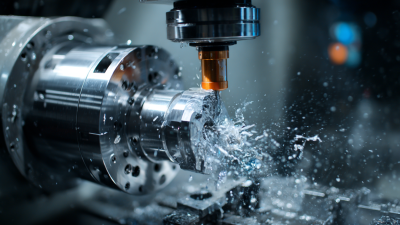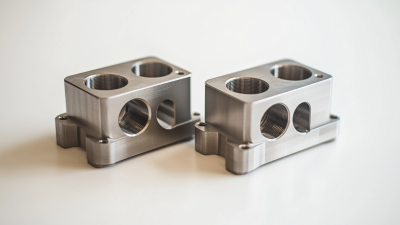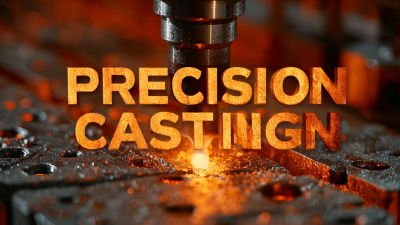 +86 180 0293 5268
+86 180 0293 5268






In today's rapidly evolving manufacturing landscape, the integration of advanced technologies has become paramount for achieving efficiency and precision. Among these innovations, CNC (Computer Numerical Control) machined parts stands out as a game-changer, particularly through its ability to produce high-quality, customized components known as CNC machined parts. According to a report by MarketsandMarkets, the global CNC machining market is projected to reach USD 100 billion by 2025, driven by the increasing demand for automation and the need for precision in industries ranging from aerospace to healthcare.

The advantages of using CNC machined parts include enhanced production speed, higher accuracy, reduced waste, and the capability to create complex geometries that traditional manufacturing methods cannot achieve. As manufacturers seek to maintain competitiveness in an era marked by rapid technological advancement, understanding the unmatched benefits of CNC machined parts becomes essential for optimizing manufacturing processes and achieving superior product quality.
The precision of CNC machining has revolutionized modern manufacturing by elevating quality standards and significantly enhancing product reliability. Unlike traditional machining methods, CNC (Computer Numerical Control) offers unparalleled accuracy, enabling manufacturers to produce complex parts with intricate designs and exact specifications. This high level of precision directly impacts the efficiency of production processes, reducing waste and minimizing the need for extensive quality control interventions. Consequently, companies can streamline their operations, achieve faster turnaround times, and ultimately reduce costs while delivering superior products to their customers.
Moreover, the integration of automation and advanced technologies within CNC machining processes further amplifies its benefits. As the adoption of robotics continues to rise, manufacturers are witnessing transformative changes in machine design and operation. The seamless collaboration between CNC machines and automated systems facilitates higher production rates and consistent output quality, aligning perfectly with the growing demand for customized solutions in the market. With projections indicating substantial growth in the CNC machine market, it is clear that embracing this technology is not only a strategic move but a necessary step for manufacturers aiming to thrive in an increasingly competitive landscape.

CNC machined parts have become essential in modern manufacturing due to their cost-effectiveness, which is primarily driven by significant savings in both time and resources. The precision and repeatability of CNC machining allow manufacturers to produce parts with minimal waste, optimizing material usage and reducing the overall production costs. This technology eliminates many of the inefficiencies associated with traditional manufacturing processes, such as manual labor and errors, which can lead to rework and increased expenditure.
Moreover, the speed at which CNC machines operate can greatly accelerate project timelines. By automating complex tasks, these machines enable rapid prototyping and production, allowing manufacturers to respond quickly to market demands without compromising on quality. The combination of these factors—reduced waste, lower labor costs, and faster production speeds—makes CNC machined parts an attractive solution for businesses looking to boost their efficiency and profitability in a competitive landscape.
In modern manufacturing, the trend towards customization and flexibility is increasingly vital, especially when leveraging CNC machined parts. These components allow for unparalleled precision and can be tailored to meet specific project requirements, leading to optimized performance and reduced waste. According to a recent report by a leading industry analyst, 70% of manufacturers now prioritize customization in their production processes to stay competitive. This shift highlights the necessity for systems that can adapt quickly to varying demands.
Furthermore, the integration of advanced PLM (Product Lifecycle Management) solutions plays a crucial role in achieving this customization. Effective PLM systems enable seamless collaboration across teams, enhancing workflow and allowing for rapid iteration during the design phase. A comprehensive evaluation of market leaders in PLM solutions shows that organizations employing these tools can reduce their product development timelines by up to 30%, facilitating quicker responses to customer needs and market changes. This agility, combined with the precision of CNC machining, positions manufacturers to not only meet but exceed the evolving expectations of their clients.
This chart illustrates the unmatched advantages of utilizing CNC machined parts, focusing on customization and flexibility in manufacturing processes.
In today's fast-paced manufacturing landscape, efficiency is more crucial than ever, and CNC (Computer Numerical Control) technology has revolutionized the way components are produced. One of the standout advantages of CNC machining is its ability to streamline production processes significantly. Time-consuming manual operations are replaced with automated precision, allowing manufacturers to achieve high levels of productivity without sacrificing quality. With CNC machines, programming can be adjusted easily, enabling rapid modifications to designs and facilitating quick turnaround times for custom parts.
Moreover, the precision offered by CNC machining minimizes the risks of human error, ensuring that production maintains high standards consistently. Components produced through CNC technology exhibit remarkable dimensional accuracy, which is essential in industries where even the smallest deviations can lead to failures. This enhanced reliability not only boosts operational efficiency but also enhances customer satisfaction by delivering top-quality products in a timely manner. As manufacturers continue to embrace CNC technology, they are finding that not only does it optimize their processes, but it also positions them to meet the ever-evolving demands of the market more effectively.
In the landscape of modern manufacturing, CNC (Computer Numerical Control) machined parts have emerged as a cornerstone of quality and precision. The reliability of CNC machined components is underscored by their exceptional durability and consistency, which are critical for industries that demand the highest standards of accuracy. According to a report by Grand View Research, the global CNC machining market is projected to reach USD 100.58 billion by 2025, driven primarily by these unmatched advantages.
The durability of CNC machined components is a significant factor that many manufacturers prioritize. These parts are produced with high-quality materials and precision techniques, which ensure that they can withstand extreme conditions such as temperature fluctuations and mechanical stress. Research by the National Institute of Standards and Technology has shown that CNC machining can achieve tolerances as tight as ±0.005 inches, thus allowing for consistent performance over time. This level of reliability not only increases the lifecycle of the products but also reduces downtime, fostering a more efficient manufacturing process.

Furthermore, standardization in CNC machining leads to remarkable consistency across production lines. A study published in the Journal of Manufacturing Science and Engineering highlights that CNC machined parts exhibit lower variance compared to parts produced through traditional methods, with discrepancies rarely exceeding ±0.01 inches. This consistency not only enhances the overall quality of the end products but also facilitates easier integration of parts in various applications, making CNC machining an invaluable asset in modern manufacturing practices.






